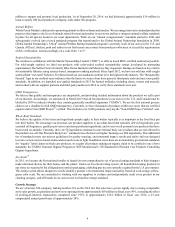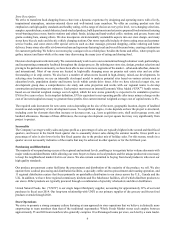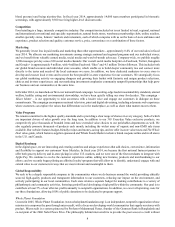Whole Foods 2014 Annual Report Download - page 17
Download and view the complete annual report
Please find page 17 of the 2014 Whole Foods annual report below. You can navigate through the pages in the report by either clicking on the pages listed below, or by using the keyword search tool below to find specific information within the annual report.14
by the IRS and other state and local taxing authorities. See Note 9 to the consolidated financial statements, “Income Taxes,” in
Part II, “Item 8. Financial Statements and Supplementary Data,” of this report.
Changes in accounting standards and estimates could materially impact our results of operations.
Generally accepted accounting principles and related accounting pronouncements, implementation guidelines, and
interpretations for many aspects of our business, such as accounting for insurance and self-insurance, inventories, goodwill and
intangible assets, store closures, leases, income taxes and share-based payments, are highly complex and involve subjective
judgments. Changes in these rules or their interpretation or changes in underlying estimates, assumptions or judgments by our
management could significantly change or add significant volatility to our reported earnings without a comparable underlying
change in cash flow from operations.
Unfavorable changes in governmental regulation could harm our business.
The Company is subject to various local, state, federal and international laws, regulations and administrative practices affecting
our business, and we must comply with provisions regulating health and sanitation standards, food labeling, equal employment,
minimum wages, and licensing for the sale of food and, in some stores, alcoholic beverages. Our new store openings could be
delayed or prevented or our existing stores could be impacted by difficulties or failures in our ability to obtain or maintain
required approvals or licenses. Changes in existing laws or implementation of new laws, regulations and practices (e.g., health
care legislation) could have a significant impact on our business.
The USDA’s Organic Rule facilitates interstate commerce and the marketing of organically produced food, and provides assurance
to our customers that such products meet consistent, uniform standards. Compliance with this rule could pose a significant
burden on some of our suppliers, which may cause a disruption in some of our product offerings.
We cannot predict the nature of future laws, regulations, interpretations or applications, or determine what effect either additional
government regulations or administrative orders, when and if promulgated, or disparate local, state, federal and international
regulatory schemes would have on our business in the future. They could, however, require the reformulation of certain products
to meet new standards, the recall or discontinuance of certain products not able to be reformulated, additional recordkeeping,
expanded documentation of the properties of certain products, expanded or different labeling and/or scientific substantiation.
Any or all of such requirements could have an adverse effect on our operating results.
The risk associated with doing business in other countries could materially impact our results of operations.
Though only 3.3% of our total sales in fiscal year 2014, the Company’s international operations are subject to certain risks of
conducting business abroad, including fluctuations in foreign currency exchange rates, changes in regulatory requirements, and
changes or uncertainties in the economic, social and political conditions in the Company’s geographic areas, among other things.
A failure of our internal control over financial reporting could materially impact our business or stock price.
The Company’s management is responsible for establishing and maintaining adequate internal control over financial reporting.
An internal control system, no matter how well designed and operated, can provide only reasonable, not absolute, assurance
that the objectives of the control system are met. Further, the design of a control system must reflect the fact that there are
resource constraints, and the benefits of controls must be considered relative to their costs. Because of the inherent limitations
in all internal control systems, internal control over financial reporting may not prevent or detect misstatements. Any failure to
maintain an effective system of internal control over financial reporting could limit our ability to report our financial results
accurately and timely or to detect and prevent fraud, and could expose us to litigation or adversely affect the market price of
our common stock. The Company’s management concluded that its internal control over financial reporting was effective as of
September 28, 2014. See Part II, “Item 9A. Controls and Procedures – Management’s Report on Internal Control over Financial
Reporting,” of this report.
Item 1B. Unresolved Staff Comments.
Not applicable.
























